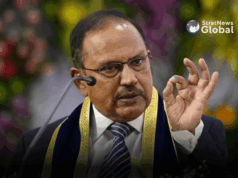
NEW DELHI: “President-elect Joe Biden has identified a deep bench of distinguished, talented and very experienced leaders and advisors who can walk and chew gum at the same time,” says Alexander Slater, Deputy Managing Director for India at the U.S.-India Business Council (USIBC). “Engagement with Europe won’t take away from their ability to work on other problems as well,” he said, adding, “the degree of China’s lack of consistency on international norms is substantial. What has happened; aggression on the Line of Actual Control in Ladakh, the new national security laws in Hong Kong, conduct in the South China Sea through expansionist tendencies, overflight of Taiwanese airspace—in order to confront these steps the world’s going to have to do it together”. Slater “hopes Europe and the United States would be able to come together to try and get everyone back on track for a rules-based international order and to work with countries like Japan, Australia and India on a free, open, peaceful and prosperous Indo-Pacific.”
The deputy India MD, USIBC spoke to StratNews Global Associate Editor Amitabh P. Revi on the whole gamut of India-U.S. relations including defence deals, trade, energy, nuclear power, climate change and renewables, the EU-China Investment deal, RCEP, ‘Atmanirbhar Bharat’, global supply chains, the pandemic and the health sector.
Will the Biden administration impose CAATSA (Countering America’s Adversaries Through Sanctions Act) like the Trump government did on Turkey for buying the Russian S-400 air defence system? Slater admitted it’s a “thorny issue” but felt both countries “have so much at stake in their relationship, are so invested in it that they’ll find solutions to work through these issues”. Although he said “it’s early days and maybe too much to read into,” the Deputy MD pointed to the incoming administration “signalling a desire, at least on the Iran front, to come to a renewed agreement to ratchet down both nuclear enrichment sanctions and tensions between the two countries. That would have ancillary benefits to the U.S.-India relationship.”
On an India-U.S. trade deal for the Biden administration, he said “it’s a reasonable assumption that a India-U.S. mini-trade deal would first lay the foundation for a much larger deal later on,” adding, “there’s real momentum and institutionalised framework across different groupings to drive forward coordinated action. So I’m really bullish on what the future bears.” On economic reform in India, Slater highlighted the simplified labour codes “which we’re studying closely” since “getting them right is critical to creating an ease of doing business and attracting foreign investment” and hoped for “great progress on the direct listing of Indian companies, which makes a really fertile environment for U.S. investment in the start-up ecosystem in India.” In areas where more needs to be done, the India Deputy MD, USIBC pointed to “more that needs to be done for regulatory stability and stakeholder engagement.” On ‘Make In India’ he applauded the “admirable goals to create jobs in India, to make India a manufacturing powerhouse” but pointed out that policy “should also remain focused on making India competitive globally that requires you to be open to foreign competition”.
Editor’s Note: This interview was recorded on January 5, 2020.















